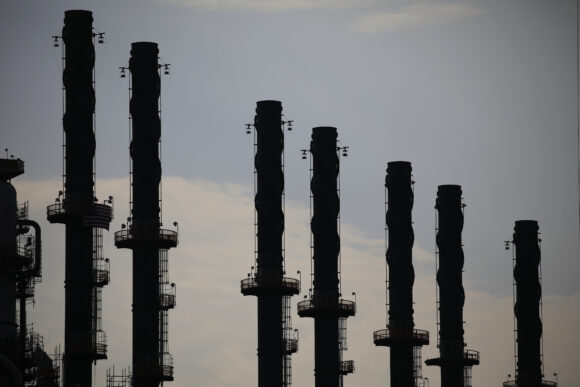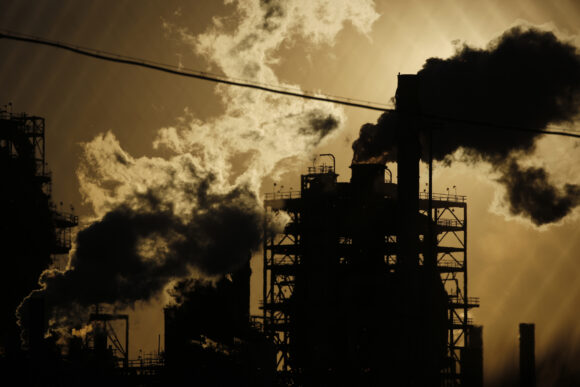The Environmental Protection Agency says its proposal to stop greenhouse gas reporting for big polluters could save oil and gas companies up to $256 million a year. Some of them are countering that it could hurt their business instead.
Companies, industry trade groups and other energy experts warn that axing the more than a decade-old Greenhouse Gas Reporting Program could immediately jeopardize oil and gas firms’ ability to claim highly valued tax credits. It could also hurt companies selling liquefied natural gas, or LNG, to Asia andEurope in the future, they say, where less carbon-intensive energy sources are increasingly more desirable.
Halting emissions reporting introduces “significant uncertainty for producers” and “unnecessary complexity into programs that are critical for deploying the very solutions needed to meet energy and climate goals,” said Dustin Meyer, a senior vice president at the American Petroleum Institute, in public testimony at an EPA October hearing on the proposal.
API, which has nearly 600 members including Chevron Corp and Exxon Mobil Corp., is a major industry group pushing to keep the program, which requires the nation’s biggest industrial polluters to calculate and report their annual greenhouse gas emissions every year. Exxon declined to comment on the proposal. Chevron, meanwhile, did not respond to requests for comment.
This reporting program “has no material impact on improving human health and the environment,” said an EPA spokesperson in an email, and killing it would allow companies more space to put their money on activities with “actual, tangible environmental impacts.”
The data it collects representsthe the nation’s main record of large industrial emissions, which is publicly accessible online. It underpins US tax credits claims designed to incentivize capturing and storing carbon dioxide underground, rather than releasing it into the atmosphere where it contributes to global warming. It’s also used by states to track progress on their climate goals, by investors to inform decisions on energy ventures and by advocates to educate communities on nearby pollution sources.
EPA is proposing to stop requiring most sources to submit this data, and to suspend collecting it for certain oil and gas sources until 2034. Of the roughly 8,000 industrial facilities and suppliers nationwide required to report emissions now, nearly 2,300 of them were oil and gas operators. In 2023, they collectively recorded 322 million metric tons of carbon dioxide equivalent, according to the agency’s latest available data. That’s the same amount of pollution as produced by driving 75 million gasoline-powered vehicles for a year.
“Rolling back or delaying federal reporting 10 years would not reduce the burden — it would create regulatory whiplash when these rules come back,” said Lindsay Larrick, chief legal and administrative officer for natural gas producer BKV Corporation, in a public comment posted online Tuesday.
In the absence of a federal program, states will step in to fill the void, Larrick added, noting this will be “extremely costly” and create “additional burden” to operators working across state lines.
Taxpayers, meanwhile, wouldn’t be able to claim the carbon capture tax credit, known as 45Q, said Jessie Stolark, executive director of the Carbon Capture Coalition, a collaboration of companies, unions, and environmental groups that includes Shell PLC and Occidental Petroleum Corp. In order to do so, companies must reference the volumes of stored CO2 reported to the EPA, she added.
The more emissions a company stores underground, the greater the credit that they can claim.

“The EPA failed to consider that the economic benefits[from the program’s carbon capture data] far outweigh the cost to the respondents of reporting,” said Keith Tracy, chief commercial officer of Elysian Carbon Management, in public comments posted online this week. Elysian Carbon Management is a carbon capture, transport and storage development company owned by Buckeye Partners, one of the largest oil products pipeline operators.
Although the exact number of companies that have claimed the credit and the amount they’ve received are not publicly available, the Carbon Capture Coalition estimates developers relying on it have already invested $77.5 billion in carbon capture projects. Oil and gas companies are partners in many of the carbon capture projects that qualify for these tax credits, Stolark said.
Companies looking to claim another tax credit, for clean hydrogen, also rely on this data, according to Drew Monroe, senior associate at the strategy firm Capstone LLC. Hydrogen can come from different sources. So-called “blue hydrogen,” which is produced from natural gas with carbon capture, qualifies for the credit, called 45V. But currently, the only way producers can prove this hydrogen type has a low-enough carbon footprint to get a higher tax credit value is through the EPA reporting program, he said.
In response to questions about potential tax credit impacts, the EPA said it welcomes public comments through Nov. 3. The Treasury Department did not respond to requests for comment.
In the coming years the absence of emissions data could also hurt the LNG industry. That’s because the European Union has put in place measures to limit methane emissions from all energy imports, including LNG, which importers will need to document. The US has stepped up its LNG exports to Europe following the invasion of Ukraine in 2022 and Europe’s declining reliance on Russian pipeline gas. While the final European methane standards are not yet defined, American exporters have been keenly following how to best supply the fuel and provide emissions data around LNG cargoes.
Japan is similarly looking to verify emissions from its LNG imports. The US was the third largest exporter to Japan in 2024, according to data compiled by Bloomberg.
“There will be ripple effects,” said former EPA official Jeff Cohen, who co-founded Xpansiv, a market platform for trading carbon credits and other environmental commodities. “This is a foundational reporting program that companies, banks, importers, exporters, local communities have been relying on for 15 years.”
Was this article valuable?
Here are more articles you may enjoy.



 Insurance Broker Stocks Sink as AI App Sparks Disruption Fears
Insurance Broker Stocks Sink as AI App Sparks Disruption Fears  Preparing for an AI Native Future
Preparing for an AI Native Future  How One Fla. Insurance Agent Allegedly Used Another’s License to Swipe Commissions
How One Fla. Insurance Agent Allegedly Used Another’s License to Swipe Commissions  Florida Engineers: Winds Under 110 mph Simply Do Not Damage Concrete Tiles
Florida Engineers: Winds Under 110 mph Simply Do Not Damage Concrete Tiles 

